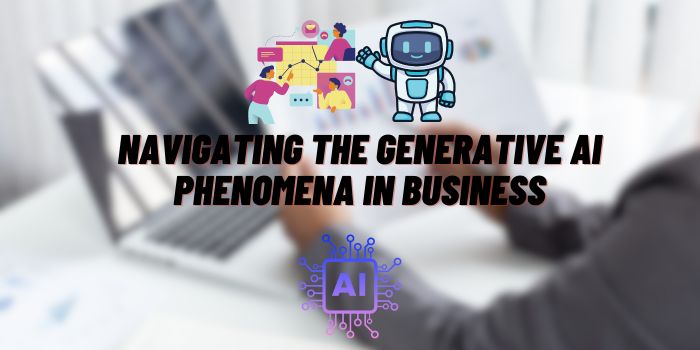Navigating the Generative AI Phenomena in Business
Generative AI refers to a subset of artificial intelligence technologies capable of generating new content, ranging from text, images, and music to code and beyond. These technologies have evolved rapidly, transforming how businesses operate, innovate, and engage with customers. For business owners, understanding generative AI’s potential and its implications is critical. This article aims to demystify generative AI, highlight its business applications, and discuss strategies for integration and ethical considerations.
Introduction to Generative AI

Generative AI is built on algorithms that can learn from a vast amount of data and then use this learning to generate new, original content that mimics the learned material. This is done without direct human input beyond the initial programming and training phase. The most common types of generative AI models include Generative Adversarial Networks (GANs), Variational Autoencoders (VAEs), and Transformer models like GPT (Generative Pre-trained Transformer) and DALL·E.
How Generative AI is Transforming Businesses
According to The Software Development Blog, there are four main areas where generative AI can be most helpful.
- Content Creation. Generative AI can produce a wide range of content, from marketing materials and blog posts to videos and music, significantly reducing the time and cost associated with these creative processes.
- Personalization at Scale. It enables hyper-personalized content for customers, enhancing user experience and engagement by tailoring products, services, and communications to individual preferences and behaviors.
- Innovation in Product Development. By generating numerous design variations, generative AI accelerates the innovation process in product development, allowing businesses to explore a wider range of options and make data-informed decisions.
- Automating Routine Tasks. It can automate repetitive tasks, such as coding or generating reports, freeing up human resources for more strategic activities that require emotional intelligence, reasoning, and creativity.
Strategies for Integrating Generative AI into Business

Integrating generative AI into a business requires a strategic approach that encompasses understanding the technology’s potential, identifying areas of application, preparing the necessary data, and considering the ethical implications. Initially, the process involves a deep dive into the capabilities of generative AI to grasp how it can solve specific business problems or enhance operations. This foundational knowledge paves the way for identifying opportunities where AI can add value, such as automating content creation, personalizing customer interactions, or generating innovative product designs.
Preparation is key, and for generative AI to be effective, it must be trained on high-quality, relevant data. Businesses need to ensure that they have access to such data and that it is organized and annotated in a way that makes it useful for training AI models. This step is crucial because the output quality of generative AI is directly tied to the quality of the input data.
Another critical aspect of integrating generative AI is addressing ethical considerations and potential biases. This involves developing ethical guidelines for AI use within the business, ensuring transparency in how AI-generated content is used, and actively working to minimize biases in AI models. Bias mitigation is particularly important, as it ensures that the AI serves all customer segments fairly and does not perpetuate existing inequalities.
Experimentation plays a significant role in the integration process. Businesses should start with pilot projects to test the waters, allowing them to learn from these experiences and iterate based on feedback and results. These pilot projects can help identify the best applications of generative AI for the business and reveal any challenges that need to be addressed.
Finally, staying informed about advancements in AI technology and continuously developing the skills of the team are essential strategies. The field of AI is rapidly evolving, and what is cutting-edge today may be obsolete tomorrow. Keeping up with the latest developments and investing in training for staff ensures that a business can continue to leverage generative AI effectively over time.
Integrating generative AI into a business is not a one-size-fits-all process but rather a tailored approach that aligns with the unique needs and goals of the business. By carefully planning, preparing data, addressing ethical concerns, experimenting, and staying informed, businesses can harness the power of generative AI to drive innovation, efficiency, and competitive advantage.
Value That Generative AI Can Add to Business

From an economic perspective, generative AI represents a transformative force with the potential to significantly enhance business value and economic outcomes. This impact is largely rooted in its ability to drive efficiency, foster innovation, and create new avenues for revenue generation.
By automating the production of content and routine tasks, generative AI can drastically reduce the time and resources traditionally required, translating into cost savings and higher productivity. For example, generating marketing content, reports, or even software code can now be accomplished at a fraction of the time and cost, freeing up human resources to focus on more complex, strategic activities that add greater value to the business. This shift not only improves operational efficiency but also enables businesses to scale their operations more effectively without a proportional increase in costs.
Furthermore, generative AI can spur innovation by providing businesses with the tools to rapidly prototype and test new ideas. This capacity for rapid experimentation can lead to the development of new products and services, opening up previously untapped markets and revenue streams. By leveraging AI to generate a wide range of design variations, businesses can explore a broader spectrum of possibilities, enhancing their ability to innovate and stay competitive.
From a customer engagement and personalization standpoint, generative AI allows businesses to tailor their offerings and communications to individual consumer preferences at an unprecedented scale. This level of personalization can significantly enhance customer satisfaction and loyalty, leading to increased lifetime value and revenue. The ability to deliver highly personalized experiences without the need for extensive manual effort is a game-changer, enabling businesses to efficiently allocate their marketing and customer service resources.
Additionally, generative AI can contribute to economic value by enabling more informed decision-making. By analyzing vast amounts of data and generating predictive models, businesses can gain deeper insights into market trends, customer behavior, and operational efficiencies. This information can guide strategic decisions that improve profitability, such as optimizing pricing strategies, supply chain operations, or product development priorities.
In essence, generative AI offers businesses the tools to enhance efficiency, drive innovation, and personalize customer experiences at scale. These capabilities translate into direct economic benefits, including cost savings, new revenue opportunities, and improved decision-making, ultimately contributing to a stronger competitive position and greater economic value in the marketplace.
Ethical Considerations and Mitigating Risks

While generative AI offers significant opportunities, it also raises ethical concerns, including the potential for creating misleading information, infringing on intellectual property rights, and exacerbating biases. To mitigate these risks, it’s important to:
- Develop and adhere to ethical guidelines for the use of generative AI in your business.
- Be transparent with customers and stakeholders about the use of AI-generated content.
- Ensure the data used to train AI models is diverse and representative to minimize biases.
- Regularly audit AI systems to detect and address any issues of fairness, accuracy, and ethical use.
Conclusion
Generative AI is a powerful tool that can transform how businesses operate, innovate, and engage with their customers. By understanding its capabilities, applications, and ethical considerations, business owners can strategically integrate this technology to enhance efficiency, drive innovation, and create more personalized experiences for their customers. However, it’s also vital to approach its implementation with caution, ensuring ethical use and mitigating potential risks.






